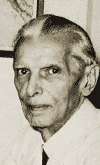On the Verge
Within a fortnight of the Missions departure from India, Congress affirmed that it had no intention of accepting the Mission's plan and stated that there could be no grouping or limiting of the federal government's powers, points so vital to the League. After, the British Government attempted to reconcile Congress, but this led to the Muslim league withdrawing all their previous acceptance of the plan on 29th July.
Wavell now made a fresh attempt to form an interim coalition government and the proposals, much the same as before, were rejected by Jinnah. The Government also went on with Congress alone, after reluctantly deciding that the League's rejection of the plan meant they could not be allowed to participate in the interim government. The temporary government was eventually established by Congress without the Leagues' cooperation, and Wavell was forced to accede to Congress' demands for the Muslim places not filled by the League, but two places continued unfilled temporarily. The interim government took office on 2nd September and for the first time there was truly a national government in India.
On 16th August, the League marred proceedings by staging a Direct Action Day organizing rallies, demonstrations and processions. In Bengal a public holiday was declared, but attempts by Muslims to force Hindu shops to close soon led to an orgy of arson, looting and murder. Large numbers of troops were called in but rioting continued for four days and according to official estimates 5,000 people were killed, 15,000 injured and over 100,000 rendered homeless. Although Muslims were initially the aggressors both parties contributed equally to the destruction of Calcutta.

The Viceroy visited Calcutta on the 25th and was convinced afterwards, that unless some settlement of Congress-League differences at the highest level could be reached, that there would be similar communal outbreaks in other parts of the country. Wavell attempted to reconcile the parties again, but to no avail. Wavell now approached Jinnah himself in an effort to bring the League into both the interim government and the Constituent Assembly. A month of intricate negotiations followed and although Jinnah repeated his demand for all Muslims to be nominated by the league he did not insists on it, and on October 13th, Jinnah sent Wavell the names of the five people including a representative of the Scheduled Castes in a tit for tat move against the Congress inclusion of a Nationalist Muslim in their contingent. Under pressure from Wavell the Congress leader, Nehru was persuaded to surrender control of the finance portfolio to League control to give them some equality in the interim government. The League members took office on October 26th, at an opportune time, as Muslim hooligans were terrorising Hindus in small towns and villages of the remote districts of Noakhali and Tippera. It took some time, but the police and military forces rounded up the Muslim gangs and restored order.

The existence of the Coalition Government led to a lull of nearly four months in outbreaks of communal fighting. The Government had no desire by either party for genuine cooperation, their only purpose in the interim government being to protect the Muslim interests and prevent Congress from grabbing all power and patronage at the centre. However, the Constituent Assembly could not be convened because the League would not accept the Mission's plan until Congress agreed to the fundamentals of the plan. By mid-November a crisis was emerging, as the Congress demanded the summoning of the Constituent Assembly. The Congress leaders then made contact with the Mission members back in England and began to ply them, saying Wavell was favouring the League. Wavell countered, but Attlee suggested Wavell should include a politician on his staff. Wavell declined and offered to resign, but Attlee did not take him up on the offer. Wavell also submitted a revised breakdown plan for British withdrawal in the event of a collapse of talks, but this was rejected twice.

At this point, Wavell decided to summon the Assembly to prevent Nehru from resigning from the interim government. Wavell again tried to get the Government to make a clear statement about the correct interpretation of the Mission's plan, but the announcement the Government was prepared to make did not match what Wavell needed. They suggested that two Congress and two League leaders go to London to discuss the situation along with Wavell, who also insisted a representative of the Sikhs be included. The conference in London was from the 3rd to 6th December and again the views of the League and Congress were found to be irreconcilable. Congress had by this time conceded that provinces must enter the sections in which they had been placed, but there was still acute disagreement over the procedure to be followed in the sections. In the end it was decided that all sides would abide by a federal court decision in India over the meaning of the Mission Statement. Back in India after the conference, Wavell again suggested the adoption of a breakdown plan. Something which could no longer be ignored as it might be needed, or that the British re-establish rule over India for a further period. Wavell also proposed a planned, phased withdrawal in the event of no solution being found to the problems.
Wavell's proposals for a phased withdrawal were substantially accepted and a few days before Christmas, the India and Burma Committee decided to recommend that March 31st 1948 be set as the date that the British would hand over power in India. However, the Government put this off, instead drawing up a plan to continue British rule if necessary and not setting a final date for withdrawal.
By this time, the All-India Congress Committee had passed a statement which came as near as possible to a genuine acceptance of the Mission's proposals as could be expected, but stated they would not be party to the compulsion of a province and that the rights of the Sikhs should not be jeopardized. The Muslim League's working party saw this as another Congress trick and decided on 31st January that the All-India Congress Committee's resolution nullified their acceptance of the December Statement and they flatly refused to reconsider their own Bombay resolution and take part in the Constituent Assembly, calling instead, for its immediate dissolution.
With the Mission's proposals completely destroyed, the British Government announced the 'definite intention to take the necessary steps to effect the transfer of power into responsible Indian hands by a date not later than June 1948'. If by that time the parties had not worked out their differences and a constitution had not been worked out by a fully representative Constituent Assembly, the British Government would decide who to hand over power to, whether a central government or the provincial governments in some areas in the best interests of the Indian people. They also announced the termination of Wavell's wartime appointment as Viceroy, and the transfer of power to Mountbatten who would oversee the end of British rule in India.

Congress welcomed the Statement, and Nehru, now recognized that Pakistan was now a certainty. The Muslim League was moderately satisfied. This was not the full six provinces Pakistan Jinnah wanted, but it was a separate state. In Wavell's last month of office, the finance minister introduced a poor man's budget, heavily taxing the big businessmen who were mainly supporters of the Congress, some modifications to the measures being undertaken to avert a first-class crisis over the Business Profits Tax. Unfortunately Wavell's last month was also marked by the outbreak of widespread communal rioting in the Punjab enflamed by the call for an independent Pakistan. And in response to a buildup of private armies, by all three major communities, the Khizar's Government declared the private armies' unlawful bodies. This challenged the Muslim League and some of them courted arrest. The ban on the private armies was lifted and the processions and demonstrations continued until Khizar resigned on 2nd march. There were communal clashes from the 4th March to 16th March on an unprecedented scale in Lahore, Amristar, Multan and Rawalpindi. The troubles were brought under control at varying paces and there was in some of these locales, much looting and slaughter. By March 21st, control had been re-established everywhere but the whole fabric of Punjabi society had been rent and the foundations of the administration shaken and prospects for reconciliation between the Muslims and non-Muslims were non-existent. Mountbatten reached Delhi on March 22nd.



